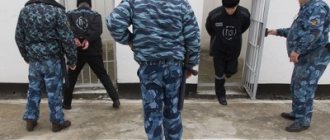As you know, imprisonment is imprisonment for a certain period of time for a crime (or more than one). Life imprisonment involves imprisonment of the offender from the moment the court pronounces the sentence until the end of his biological life. But why do prisoners in some countries receive multiple life sentences?
Long sentences are given for a reason. Thus, especially dangerous criminals will be deprived of any opportunity to be released not just ahead of schedule, but in general in principle. Since the death penalty is prohibited in many countries, there is nothing left to do but lock the convicted person in a cell until the end of his death.
It is worth noting that criminals can serve a minimum sentence and then apply for early release (parole). To prevent this, they are given crazy deadlines that simply cannot fit into our heads. After all, in fact, a person cannot live for a couple of hundred, or even thousands of years.
For example, if a criminal was given multiple life sentences, served the minimum number of years, and then received parole, he would still remain in prison because the next count of the second life sentence would begin, and so on. That is why he is awarded several life sentences or a couple of thousand years behind bars.
Gabriel March Grandos
Sentence: 14 years and 2 months imprisonment + fine 500 euros
A 22-year-old resident of Spain worked as a postman on the island of Palma de Mallorca. During the 2 years of his work (1968-1970), he did not deliver as many as 42,768 letters to their recipients. Instead, Gabriel opened the letters and took out bank checks. In total, he managed to steal about 50 thousand euros. The court sentenced the young man to 384,912 years in prison (9 years for each undelivered letter) and a fine of 19 million euros. However, later the punishment was reduced to 14 years in prison and a 500 euro fine.
Longest prison sentences
Two life sentences are far from the limit. Consider the longest prison sentences in history:
- The absolute record holder for the severity of punishment is not a serial killer, but an ordinary postman. It is known that in 1972, a 22-year-old resident of Palma de Mallorca could have been sentenced to 384,912 years in prison. This figure did not appear just like that. The fact is that during his time as a postman, the young man did not deliver about 43 thousand letters. And for each undelivered letter, Italian legislation provided for punishment of up to 9 years in prison. The prosecutor decided to demand the maximum punishment and announced this figure. The court was more lenient and sentenced the offender to 14 years in prison and a fine of 500 euros.
- For the brutal murder of Dudley's wife, Wayne Kizer received 10,000 years in prison. He was also given two additional life sentences for the murders of his mother-in-law and a college student. To date, this sentence remains the longest in the history of the US judicial system.
- Florida serial killer and rapist Bobby Joe Long received 28 life sentences. He is guilty of the murders of more than 20 women. In 2019, after 35 years in prison, Long was executed.
Thus, life imprisonment is far from the harshest punishment. Despite the fact that the prisoner has only one life, a sentence of several life sentences is fully justified. In this case, there is a guarantee that a dangerous criminal will actually spend his entire life behind bars.
John Gracie
Sentence: 21 life sentences and 12 death sentences
The famous maniac clown from the United States, John Gracie, raped and killed 33 people over 6 years. Among his victims were young boys. The maniac kept most of the bodies in his own basement. In addition, John was a fairly well-known politician and activist, and also worked as a clown at children's parties. He was convicted in 1980 and executed by injection in 1994. They say that it was this maniac who became the prototype of the clown from Stephen King's book “It”.
John Gracie
Life in prison
The longest prison sentence actually belongs to the American criminal Paul Heidel. In total, he served almost his entire life in prison - 68 years and 245 days. In 1911, Paul was convicted of second-degree murder. At that time the guy was only 17 years old. The imprisonment imposed by the court was 20 years.
But at the end of the term, it turned out that Paul was insane and had mental problems. After that, he underwent treatment in a psychiatric hospital. And then he was sent back to jail. In 1974, the man was granted parole, but he refused to leave prison. After 6 years he was finally released. Paul spent the last years of his life in a nursing home in New York, where he died at the age of 93.
Paul Heidel before and after prison
“The longest term in the history of Russia”
On January 20, the Yaroslavl Regional Court, in record time, announced the verdict of the appeal court against the former mayor of the city, Evgeny Urlashov, and his colleagues, Alexey Lopatin and Dmitry Donskov. The decision of the previous court was upheld. The defendants were charged with receiving a bribe and attempting to receive a bribe on an especially large scale. In August 2016, the Kirovsky Court of Yaroslavl found Urlashov and Lopatin guilty and sentenced them to 12.5 and 7 years in a maximum security colony, respectively, and also imposed a fine of 60 million rubles. The third defendant, Dmitry Donskov, was acquitted. Evgeny Urlashov has repeatedly called this case politically motivated.
The August verdict of Judge Mikhail Ratekhin did not suit both sides. Lawyers for Evgeniy Urlashov and Alexei Lopatin considered the court's decision to be excessively cruel, and the prosecutor did not agree with the acquittal of former assistant mayor Dmitry Donskov. The appellate instance began considering this case on December 21, 2016 and planned to announce the decision on December 28, but the hearings were postponed several times due to Evgeniy Urlashov’s complaints about poor health. The former mayor of Yaroslavl and his adviser participated in the hearings of the appeal court via video link from the pre-trial detention center, where they had already spent about 3.5 years.
Dmitry Donskov, Evgeny Urlashov and Alexey Lopatin during the announcement of the verdict in the Kirovsky Court of Yaroslavl, August 2016
During the appeal, Lopatin and Urlashov insisted on their innocence. The former mayor of Yaroslavl has repeatedly said that his criminal prosecution is the authorities’ revenge for refusing to cooperate with United Russia and declaring his gubernatorial ambitions.
When you are tormented for something you didn’t do, you can’t come to terms with it. That's why we're still in shock
In his last word, Evgeny Urlashov said, among other things, that his team is being judged for “independence”: “When you are tormented for something you didn’t do, you can’t come to terms with it, this is the most problematic thing. That's why we are still in a state of shock. They wanted to punish us for being independent. But 3.5 years is already a very big punishment for the fact that we were independent.”
The August sentence of the Kirov court of Yaroslavl to Evgeny Urlashov - 12.5 years in a maximum security colony and a fine of 60 million rubles - is one of the most severe for an official of this level on charges of taking a bribe. The first episode for which the former mayor of Yaroslavl and his colleague Alexey Lopatin were found guilty is related to an auction for the repair and improvement of streets in the city, which took place in 2012. Judge Mikhail Ratekhin considered it proven that Urlashov and Lopatin extorted a bribe of 18 million rubles from the director, member of United Russia Sergei Shmelev in exchange for winning this auction. Advisor to the former mayor Alexey Lopatin was found guilty of attempted mediation in accepting a bribe. Entrepreneur Andrei Zakharov and director of the Agency for Municipal Order of Housing and Public Utilities in Yaroslavl, Maxim Pokalainen, were also sentenced in a special manner for this episode.
Evgeny Urlashov during the announcement of the verdict in the Kirovsky District Court of Yaroslavl, August 2016
Evgeny Urlashov has repeatedly stated that he considers director Sergei Shmelev to be a provocateur and “agent” of the Main Directorate of Economic Security and Anti-Corruption (GUEBiPK), whose leaders are now also in the dock. In the court of appeal, Urlashov explained that Shmelev offered him to pay kickbacks in favor of United Russia:
The respected prosecutor Andrianov said that this is not such a harsh measure that they used to give 25 years. Of course, in 1937 they generally shot people right away
“I was struck by Shmelev’s carelessness when he said that he would resolve the issue with United Russia about allocating an additional 50 million rubles through the deputies of the regional Duma to the road fund of the city of Yaroslavl. But he added that part of the money would have to be given to United Russia. Shmelev said everywhere in his testimony: kickback, illegal reward, bribe. In response to the offer to return part of the money to United Russia, I also called it a kickback, although this word was not directly heard from Shmelev’s lips at that time. Out of spite, I told him to roll back. I hit with the same card that hit me,” Yarnovosti quoted Evgeniy Urlashov as saying.
The second episode of the case, which concerns only Evgeny Urlashov, is related to the receipt of a bribe from the director of a construction company, also a member of United Russia, Eduard Avdalyan. The court found that Urlashov received a bribe from Avdalyan totaling 17 million rubles for the transfer of ownership to Yardorstroy.
Another person involved in this case, Urlashov’s assistant Dmitry Donskov , was acquitted by the Kirov court. However, he is also present at the hearings of the appeal court, since the prosecutor's office did not agree with his acquittal and filed a presentation. Previously, Dmitry Donskov said that he did not consider his persecution to be politically motivated. In his case, it turned out to be “ordinary sloppiness”: according to Donskov, when deciphering the texts of the “wiretapping”, operatives attributed to him phrases that he did not utter, which became clear in the later stages of the investigation.
Dmitry Donskov during the announcement of the verdict in the Kirovsky District Court of Yaroslavl, August 2016
During the consideration of the case in the appellate instance, Dmitry Donskov asked the court to leave his sentence unchanged, Evgeny Urlashov and Alexey Lopatin asked to acquit them. The lawyer of the former mayor of Yaroslavl, Ksenia Karpinskaya , said that the harsh sentence actually deprives Urlashov of his future life: “He is 50 years old (he will turn in July 2022 - RS), he will spend another 12.5 years in prison, and he has already spent 3.5 years spent under strict conditions. Given his state of health, such punishment cannot be fair and humane. The respected prosecutor Andrianov said that this is not such a harsh measure that they used to give 25 years. Of course, in 1937 they were shot immediately,” the lawyer was quoted as saying by Yarnovosti.
The executive secretary of the federal political council of the Democratic Choice party, Kirill Shulika , on the eve of the meeting of the Yaroslavl regional court, told Radio Liberty what the political background might be in the case of Yevgeny Urlashov and why it is now of no interest to either the federal authorities or the opposition:
“I hope that something will change in the appeal and the court will finally take the side of the law, and not the side of political expediency.” But the practice of considering such cases shows that, at best, we can talk about a slight reduction in the term, but not about determining guilt or innocence. The second instance always supports the court of the first, especially in political matters and in high-profile criminal trials. I hope that Urlashov’s sentence will be reduced. But if this does not happen, there is a high probability that he simply will not serve until the end of his sentence, he has already spoken about this himself, and his lawyers have talked about it.
Kirill Shulika
– Do you mean his state of health?
- Yes. He has been in a pre-trial detention center for so long, and his health is undoubtedly compromised. Of course, he is getting stronger and holding on, but his health leaves much to be desired. After the pre-trial detention center, a colony or prison awaits him. At the same time, he still has an absolutely astronomical fine. If he does not pay it, then, as practice shows, he may not be released on parole (although by law they have the right). Such a fine is specifically imposed so that the person serves the term from bell to bell. He had never had the kind of money that he was given as a fine.
– He himself said that the matter was political, that Sergei Shmelev was a provocateur and he was framed. What is the political motive for this case, why, in fact, is he being imprisoned?
No one in Russia has ever received more under this article than Urlashov
– The 12.5 years imposed by the court of first instance for attempted bribery is the longest sentence in the history of Russia. No one in Russia has ever received more under this article than Urlashov. Urlashov's lawyers studied judicial practice and came to this conclusion. Even the mayor of Makhachkala, Said Amirov, who was taken by special forces, with helicopters, with planes, with a whole special operation of all Russian special services, received less - he received 10 years. 7 years with Lastochkin, the mayor of Rybinsk. And such a long term is connected with one thing - Urlashov was an opposition mayor, he won the elections against United Russia, he could become the governor of the region, that is, he could actually make a good political career with popular support, and the post of mayor was a launching pad for him. This is a completely normal phenomenon in a civilized political system, and here the authorities show all of us who are involved in politics, they show that such things are unacceptable in the Russian political system. That is, in order to make a political career, you need to seek not the support of the people, but negotiate with the authorities, this is the first thing.
Such a long term is connected with one thing - Urlashov was an opposition mayor, he won the elections against United Russia, he could have become the governor of the region, he actually could have made a good political career with popular support
And secondly, he really bothered many people. He interfered with the corruption that developed in the Yaroslavl region, and many have probably forgotten, but telephone conversations between the former governor Yastrebov and Pogosyan, a businessman who was also busy building roads, and with the same Shmelev, where they discussed competitive procedures for cleaning the city. The regional governor actually intervened in this matter. If you don’t call it corruption, then what is corruption? And there are quite a lot of such manifestations. Now we see that the government has changed in the region, but the region has not received any relief. Firstly, the Varangians came, and secondly, the people in the region were tired. And the Urlashov case, of course, undermined trust in both the authorities and the election procedure. This is generally a matter that will have quite long-term consequences in terms of, as they say, people’s participation in political life. They talk about the need to increase turnout for the presidential elections, but in such cases, turnout, on the contrary, is lowered. I don’t think Urlashov will be quickly forgotten; this is a serious problem for the authorities.
Action in support of Evgeny Urlashov in Yaroslavl, September 2016
“At the same time, one gets the feeling that Urlashov’s case is remembered only in Yaroslavl, there are rallies in his support there, people are following this case. But at the federal level they don’t talk about it: neither the authorities nor the opposition.
– Let’s see what the authorities and the opposition are talking about in Russia in general? They talk about Trump, about Obama, about Syria, about Ukraine. They don’t talk about the Urlashov case, because they don’t talk about the fact that the last hospitals in Moscow are closing and again there is a wave of talk about the reorganization of clinics. This is happening in front of the authorities, in front of the opposition, and they do not notice it, but discuss the prospects for the presidency of Donald Trump. Urlashov is generally located in Yaroslavl, and for them it is very far away, and this is not on the agenda. But Yaroslavl is a big city, Urlashov was popular there, as in the entire region. But there is no attention from the federal authorities to this: neither the authorities, nor the opposition, and it turns out that people find themselves alone with this problem, and their trust in both the authorities and the opposition is undermined. And on January 20, the main thing will not be the Urlashov trial, but the inauguration of Trump. We live in a completely different information agenda that is simply different from reality,” concludes Kirill Shulika.
On April 1, 2012, independent candidate Evgeny Urlashov won the mayoral elections of Yaroslavl against United Russia representative Yakov Yakushev. Urlashov received almost 70% of the vote. After the victory, he declared: “It’s time for change! Let the Russian Spring be born in Yaroslavl!”
On the night of July 3, 2013, Evgeny Urlashov was arrested by representatives of the economic security department of the Ministry of Internal Affairs, his assistants were taken into custody on July 5, 2013. Evgeny Urlashov and Alexey Lopatin have been in prison for 3.5 years. On the Change.org platform, civil activists are collecting signatures for a petition demanding the release of the former leaders of Yaroslavl.






